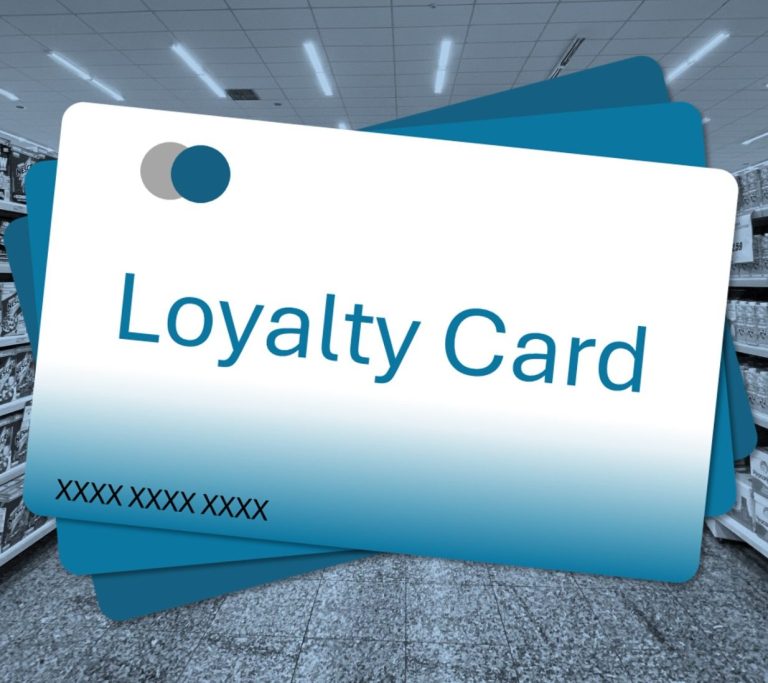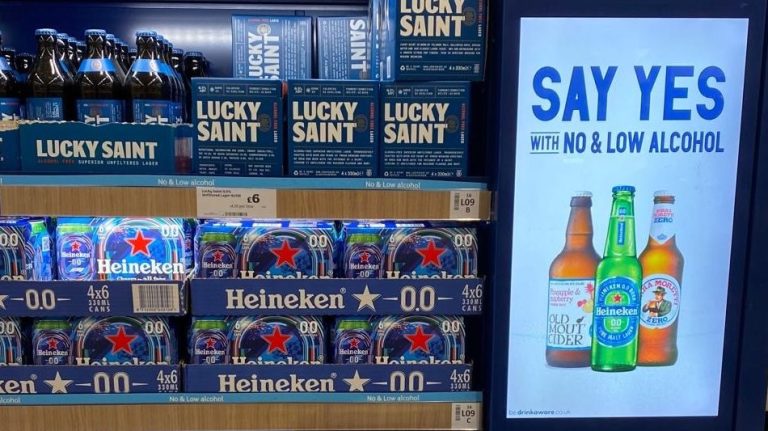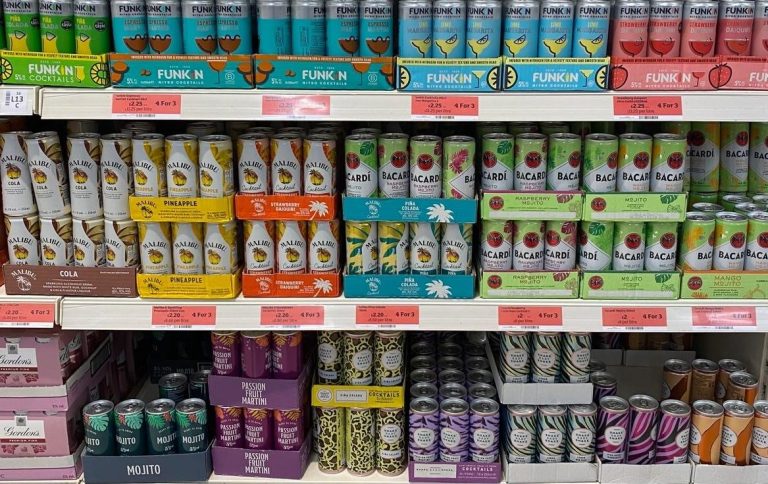Opinion in the news
Are loyalty cards failing in their core objective?
December 2024
In a recent review of 50,000 loyalty-priced products, the Competitions and Markets Authority showed 92% offered genuine savings against the usual price with an average saving of 17-25% buying loyalty priced products at the five supermarkets examined: Tesco, Sainsbury’s, Waitrose, Co-op and Morrisons (source Gov.UK Nov 27th).
Clearly, done well, it pays dividends, especially for the likes of Tesco and Sainsbury’s, for whom market share is growing. So, a well-deserved pat on the back for them.
But not so fast! The report also highlighted that 55% of people think ‘usual’ prices are upped to make loyalty deals more appealing. This is in line with the 59% cited by Retail Week earlier this year.
This is worrying, as it demonstrates a lack of trust in retailers, and their suppliers, with 76% of shoppers saying that loyalty pricing has not changed where they shop; as loyalty cards, in their current form, are not designed just to reward and retain loyal customers. They exist as a vehicle for elevated competitiveness and market share, to attract new customers and encourage them to spend more.
So, more work needs to be done to win the hearts, minds and loyalty of shoppers. Getting under the skin of what motivates them by finding ways of creating meaningful connections particularly in a less than stable post budget environment. The role of loyalty cards must go beyond price, they need to have long-term ambitions to attract and lock customers in. This will require an in-depth understanding of what truly makes them tick.
And it’s not just about price. In the development of a range of category strategies over the course of this year by The Category Management Company, price rarely rears its head in terms of what really matters to them for long-term prosperity and happiness. It’s about the importance of family, mental wellness, the environment, health and security.
So, as an industry, we will always need to acknowledge the importance of price for short term gain but also look beyond it to build true loyalty and trust by looking deeper and beyond it. Perhaps only then can meaningful loyalty be achieved.
The Category Management Company helps businesses assess, refresh and develop category visions, strategies, category growth stories and plans that are future proof, relevant and ready for growth.
For more information or to arrange a chat with Patrick or Amit contact us on:
info@TheCategoryManagementCompany.com


Opinion in the news
Breaking the Gen Z Code
By Freddie Finlay, final year Oxford University undergraduate and intern at The Category Management Company.
September 2024
Imagine a typical Oxford student. You may see a gown wearing, croquet playing, champagne swilling, upper class type. Yet, despite the stereotype, most of us come from very ordinary backgrounds.
I’m your typical student. I attend the odd lecture, occasionally seen ‘Down The Bar’, shop in Tesco, eat pizza and love a Meal Deal. So, during my internship with The Category Management Company, I’ve been struck by how grocery retail is not fully exploiting my generation.
If what I read is true, we’re ‘fickle’ and ‘demanding.’ But in reality, we’re making our own shopping choices for the first time, shaping our behaviours for the future right now; standing in the wings to play a major role as shoppers for decades to come.
Breaking the shopping code of my generation of Gen Zs must surely present a commercial opportunity, so here are my ‘decoding’ observations:
- Format Failure – with no car, I use shops within bag carrying distance of my college, so I’m confined to convenience formats, where I find larger supermarket best-selling ranges seemingly compressed into smaller layouts. This is our channel but there is little or no inspiration, just products that largely appeal to my parent’s generation. Where are the products that appeal directly to me? A challenge as we come from completely different cultural standpoints, taking me to my next point.
- The Range Paradox - On visits to larger supermarkets, which I never normally frequent, I was overwhelmed by choice. Unique pack formats with striking designs, like Kim Chi noodles or Tikka Masala in a can, are a 'go to', but I struggle to find them where I normally shop. The paradox? Gen Z do not shop in larger store formats where the products they want are stocked but shop in convenience formats where they are not! Note, I do like the pizza meal deal for one!
- The Invisible Environment – my generation is the first to have been raised on the importance of protecting the environment. But I was disappointed by how little this is reflected in-store in terms of both pack labelling and product grouping. Why not dedicate an easy to find section to showcase well labelled environmentally friendly products?
- Meal Deals represent fantastic value for money (taste and price are important.) But retailers are missing a trick. Variety and trying new things are also central to my decisions. We’re now being offered Iced Coffee, for example, but only alongside old favourites from big brands. Why not use some of the meal deal space to trial innovations or flavours, appealing to a more experimental audience?
- Loyalty – I love my Club Card, and expect the algorithms know my exact shopping habits. But I’m not sure they know ‘who’ I am. I may be short on money, but this doesn’t mean I don’t want great tasting and quality products. Others target students with student-specific discounts, yet grocery retailers don’t seem to take us as seriously. I think it’s simple, build loyalty by using student-targeted discounts on quality products within bulk foods like pasta and convenience products like ready meals.
Don’t get me wrong, I’m in awe of this industry. Its complexity and sophistication are beyond anything I had expected before stepping into its orbit. But, if my observations are anything to go by, there’s a danger that retailers may continue to 'mainstream' their offer in the hope that Gen Z will conform in time. And truthfully, I'm not sure that’s going to wash.

Opinion in the news
Rise Of Gen Z Means FMCG Sector Can’t Afford To Brush Sustainability Concerns Under The Carpet
September 2024
The societal impact of the Gen Z cohort emerging into the working population with firm beliefs about sustainability will add pressure on retailers and FMCG companies to more fully understand the implications of environmental change for shoppers and categories.
This is according to Patrick Finlay, Managing Director of The Category Management Company. He cites two studies, one by Barclaycard, suggesting 82% of Gen Z have concerns about sustainability and another by First Insight, highlighting that 75% of Gen Z place sustainability higher than brand name, at 49%, as a factor important to purchase decisions, as reasons for the sector to take note.
“Frugalpac’s paper bottle innovation, some of Aldi’s wine selection and Greenall’s Gin are all good recent examples that green policy and strategy, for some, has not been consigned to the ‘too hard or too expensive box’,” said Finlay. “And others, such as Asda, who recently abandoned its refill and reuse trial, have at least taken a punt; lessons learned and returned to the drawing board.
“But the full realisation of any meaningful sustainability strategy will likely be a slow burn; for most of the major retailers, the ambition is to get to net zero for their internal operations by 2035. Set this against the Gen Z beliefs, and you have to ask as we enter our next three to five-year planning cycle, whether another five-flavour range extension is really going to cut it!”
Finlay believes the learning is simple: “One of these is fully understanding the implications of environmental change for consumers, shoppers and categories. Whilst I’m not suggesting it’s being ignored, many years spent developing category visions and strategies have taught me that, to paraphrase our new Prime Minister, talking the talk is a lot easier than walking the walk. Creating change requires not only a strategic vision but also the intent to act upon it. For, let’s face it, we will be judged by our actions and not our good intentions.”
He notes that this is perhaps more pronounced in these uncertain times when it is those who are bold and have the courage of their convictions to invest in the long term who will be remembered for creating sustainable value for everyone.
“The emerging generations of paying consumers and shoppers will not be forgiving; they will make active choices based on their belief systems, and, what’s more, will not be willing to pay any more for it,” said Finlay.
“For our industry, we need retailers and their suppliers to lead and innovate because we’re still in a phase of experimentation, just like Asda’s refill and reuse trial; where we plan, we execute, we learn and refine. Being relevant is everything, adapting to trends and activating against them with a willingness to admit defeat or celebrate success when we get it right.”
He argues that this kind of change does not happen by chance or good fortune. “It is realised by discipline in developing long-term strategies, category visions, for example, where suppliers and retailers have a responsibility to set and elevate category direction and ultimately value, providing shoppers and consumers more reasons to shop and consume including hard-won environmental strategies. For without this pioneering and visionary spirit, we would still be living in the dark ages.”
Celebrating 6 Months
We are celebrating six months since we formed The Category Management Company and we're going from strength to strength!
Thank you to all our clients and those whom we sought advice.
We look forward to working with you over the next 6 months.


Our Opinion:
Be "Green" with a Category Vision
Develop your Category Vision to unlock your Environmental and Green business policy credentials
July 2024
Whilst we aren't surprised, as wine in a box has been around for ever, we were struck by Frugalpac’s paper bottle innovation. Including some of Aldi’s wine selection and Greenall’s Gin, we were pleased to see that green policy and strategy, for some, have not been consigned to the ‘too hard or too expensive box.’ For others, such as Asda, who recently abandoned their refill and reuse trial (Grocer 8th July), have at least taken a punt; lessons learned and back to the drawing board.
Years spent developing category visions have taught us that, to paraphrase our new PM, sometimes talking the talk is a lot easier than walking the walk. Creating change requires not only a strategic vision but also the intent to act upon it.
In uncertain times it is those who are bold and have the courage of their convictions to invest in the long term, are the ones most likely create sustainable value for everyone; after all no-one saved themselves rich.
By developing long term strategies, category visions for example, suppliers and retailers take a proactive stance to help elevate category direction and value; providing shoppers and consumers more reasons to shop and consume including hard-won environmental strategies. For without these pioneers and visionaries, we would still be living in the dark ages.
The Category Management Company are experienced in delivering insight led category management consultancy solutions, from category visions to the management of operational projects.
For more information or to arrange a chat with Patrick or Amit contact us on:
info@TheCategoryManagementCompany.com
The Grocer
We must walk the walk, not just talk the talk on sustainability
Article: 14 August 2024
Opinion in the news
Gen Z demand for no/low alcohol shows how category visions can help solve the volume conundrum
June 2024
Recent research* showing that, as alcohol category volume sales decline, the no/low alcohol segment continues to grow, reveals the importance of having a category vision that taps into the needs and wants of Gen Z to solve the volume sales conundrum
The research this month, from IWSR, shows that, while total beverage alcohol volumes in the UK declined by -2% between 2022 and 2023, ‘the overall no/low-alcohol segment showed volume growth of 47%, 2022 to 2023, with forecast volume CAGR of +19%, 2023 to 2028’
“Whilst the grocery market struggles for volume growth, you just need to walk up the beers, wines and spirits aisle to witness an impressive display of ‘trend bucking’; with innovation, space and range in the low and zero alcohol sector of the category exploding,” explains Patrick Finlay, Managing Director of The Category Management Company.
“The trend has been emerging slowly over the past decade but has accelerated for several reasons, not least the Gen Z cohort growing its demand for taste variety, convenient formats, and healthier propositions.”
And it is not by accident that, Finlay says, this sub-sector of the BWS category has evolved at such pace. It is attributable to retailers and their suppliers methodically identifying the trends, quantifying them and developing product and in-store solutions that few other categories can stake a claim to.
“Having insight (and foresight) will always pay dividends. A clear category vision, an evidence-based understanding of where long-term growth will come from, alongside a plan to activate, sets categories, suppliers and brands apart from the herd.”
So, Finlay adds, if you are asking the question of how to grow long term volume, without getting into the downward price/promotion spiral, it’s worth looking at the BWS category.
“Take a beat. Step back and invest in developing the insights that will underpin a consumer and shopper led category vision,” he concludes.
The Category Management Company helps businesses assess, refresh and develop category visions, strategies, category growth stories and plans that are future proof, relevant and ready for growth.
For more information or to arrange a chat with Patrick or Amit contact us on:
info@TheCategoryManagementCompany.com
*IWSR 13th June 2024.
https://www.theiwsr.com/no-and-low-alcohol-drinks-outperform-a-declining-uk-alcohol-market/




Review your Vision
It’s time to review and refresh your Category Vision
June 2024
Just consider this, according to a recent study 75%* of shoppers in the UK have changed how they shop since the cost-of-living crisis! We have witnessed shifts in behaviour, with physical and mental well-being at the forefront, but also in how we shop, with 45% of shoppers cutting down on occasional treats and 38% avoiding impulse purchases. What’s more, 37% have changed supermarkets and 35% have swapped their normal brand for own-label.
Another study** states:
- 52% of consumers say they have had to cut their non-essential spending.
- Only 3% say they’ve been able to spend more on non-essentials.
- Eating out is the most common (72%) discretionary spending cut.
- Over a third (36%) of consumers say they are using loyalty schemes more.
- Four times more (47%) consumers would put money into savings than spend it on non-essentials (11%) if prices of goods or services drop. A fifth would use it for essential costs.
And this doesn’t even cover the Gen Z social shopping revolution, we’ll deal with that in a future post!
The question we have is: ‘What are you doing differently to adapt to these changes in shopper and consumption behaviour?’ Where hoping that pre-2022 category visions and activation plans will still ‘stick’ in this environment, may just be wishful thinking.
Our advice is to review your plans and strategies and assess if they are fit for purpose. Are they still relevant to the environment your consumers, shoppers and retail customers are operating in?
The Category Management Company helps businesses assess, refresh and develop category strategies, category growth stories and plans that are future proof, relevant and ready for growth.
For more information or to arrange a chat with Patrick or Amit contact us on:
info@TheCategoryManagementCompany.com
Source: * Clear Channel March 24 **KPMG April 2024
Opinion in the news
FMCG companies must think ahead to stay competitive in still uncertain inflationary times, category management experts argue.
March 2024
Seemingly conflicting pieces of research published over the last two weeks, which both show food inflation easing off as well as households switching to own brands to combat rising prices highlights the challenge to FMCG companies as they try to remain competitive during current inflationary pressures.
That’s the message from category management specialists The Category Management Company following a survey by consumer group Which? found 46% of respondents had bought more own-brand goods in the last year because of food inflation. This trend was supported by data from Kantar indicating that 54% of spending at discount retailers like Lidl and Aldi was coming from the ‘ABC1’ social demographic group. And yet this at a time when rises in the cost of a supermarket shop appear to be slowing down as food price inflation eases, although food inflation is only just returning to March 2022 levels with households still feeling a squeeze on disposable income.
So, how should FMCG suppliers be responding?
"What is certainly true is that doing nothing and waiting for the latest tsunami of events to wash over us is not an option,” says Patrick Finlay, Managing Director at The Category Management Company.
“Many big companies will be reacting to these pressures already by building 'war chests’, protecting themselves from the pressures of inflation and immediate retailer volume growth expectations. Whilst this can work, it is only ever a short-term measure.”
The secret, says Finlay, is to address the challenge through both short-term operational and long-term strategic lenses.

“First, focus on what they can do now by getting the basics right. Thinking about how to optimise and protect what they already have.” he says. “For example, is their range, distribution and channel execution firing on all cylinders? Getting the category management basics right can unlock revenue and volume for supplier and retailer alike. Taking the heat off whilst focusing on the bigger strategic prize.”
The second thing to do, he adds, is to invest in the long term.
“No one has ever saved themselves rich. It has been proven that investing during the most fiscally difficult times has generated long term benefits. This can take the form of above-the-line investment which leads to long term loyalty. But, also by developing long term strategies, category visions for example. Setting out the roadmap today, by planning a strategic course for the next three to five years to deliver value-added volume. By devising a category vision, suppliers are taking a proactive stance to help cushion some of the unforeseen events caused by inflationary pressures whilst maintaining direction and long-term purpose.”
The Category Management Company are experienced in delivering insight led category management consultancy solutions, from category visions to the management of operational projects.

Christmas sales data shows Iceland 'doing the right thing' resonated well with consumers, category management specialists argue.
New industry data showing Iceland outgrowing the big four supermarkets at Christmas with festive grocery sales climbing to their highest level for four years, shows it is possible to perform well without advertising if your messaging resonates with shoppers, one leading category management specialist has argued.
Patrick Finlay, Managing Director of The Category Management Company, made the comment after Nielsen figures were revealed in Retail Week that sales at the frozen-food specialist jumped 4.7% in the 12 weeks to December 31st, making it the fastest-growing grocer other than discounters Aldi and Lidl.
“Of course, this is all subjective and depends on how you measure success,” explains Finlay.
“But if you examine performance through a lens of higher intent, you can see how Iceland’s positioning cuts through to consumers. To axe their Christmas advert with a view to focusing on lowering prices, to help families still struggling with the cost-of-living crisis, was at the centre of their Christmas media strategy. Malcolm Walker even said at the time ‘it was a no-brainer.’”
This, continues Finlay, was neither opportunistic nor a disingenuous gesture.
“This is typical Iceland,” he continues. “There are few high street retailers more in-tune with their customers and, as a family run business (in probably the most competitive retail market in the world) this must be the secret to their success.”
Iceland, he says, has always placed its customers first.
“They are constantly innovating; finding new ways to stand apart from their very noisy neighbours. Reinventing themselves, where shopper and product experience come first. It’s as though they were listening to Sir Jack Cohen when he said...” In good times and bad, the company that works hard, that insists on offering value for money, and is not afraid to experiment and make changes, will always prosper.”
Values, and ‘value’, have always been at the core of the Iceland offer. They were trail blazers in free home delivery, amongst the first (if not the first) to commit to eliminate plastic, genetically modified ingredients, artificial colourings, flavourings, non-essential preservatives and monosodium glutamate from their own label products. Overlay this with the launch of exclusive ranges including Greggs, Harry Ramsden, Chiquito, and TGIFriday, and it becomes easier to understand why Iceland has survived.
“They have their finger on the pulse,” adds Finlay. “They truly understand their shoppers and they move quickly and decisively to ensure they remain loyal. How else could they have possibly survived?
So, fast forward to Christmas 2023 and Iceland decide to make what is arguably a very ‘brave’ decision not to advertise. But remember, Iceland have never really been on the band wagon. They have always had both eyes on the long-term prize of customer loyalty.”
The lesson, Finlay concludes, is that whether working on a category vision, a new product sell-in, or even in day-to-day operations, the key to survival is to always keep customers front of mind, adjust when required and, as Sir Jack Cohen said, to not be afraid to experiment.
“Suppliers and retailers need to ask themselves, what are your customers’ needs right now; is your proposition relevant to them; and how will you activate to meet their specific requirements? Insight is at the core, a true understanding of needs, of why things are happening, how this impacts behaviour and taking the necessary steps to activate effectively.”

Opinion in the news
Importance of Category Vision
We must think long term to avoid a race to the bottom
January 2024
The industry is entering a new ‘race to the bottom’. So suggests this month’s news that Asda is price matching against both Aldi and Lidl across 287 products.
It’s a powerful draw at a time of ongoing inflation, which stood at 6.7% in December, according the BRC shop price index. However, this phase could see the shopper ostensibly winning and the retail sector losing. After all, more than two-thirds (69%) of the 120,000 retail job losses in 2023 came from rationalisation, according to the Centre for Retail Research this week.
We could say ‘it was ever thus’. Retailers must be seen to be competitive to maintain customer loyalty and will always take necessary steps to create perceived value. But as we slowly emerge from the darkness of the past three years, surely green shoots will begin to emerge.
Recent history reminds us shocks to the system are never far away. Both the US and UK have elections this year, each of which has the capability of throwing a curveball into the mix.
Theoretically, raw material prices should start to fall, the labour market should settle, and wages should stabilise – meaning inflation should also fall. However, geopolitical events in the Red Sea and Suez Canal, for example, add to the uncertainty.
Although the US and UK are acting to stabilise the global economy and quash uncertainty, any negative impact on oil and raw material prices will likely push costs up in the supply chain, possibly placing future upward pressure at the till.
So retailers and suppliers will not only need to respond to events, but keep an eye on the future and plan accordingly.
The industry needs to take control of its own outcomes. It should ask itself: how can it add value? How can it create the conditions where we can grow our categories and businesses, whilst providing consumers and shoppers with real as well as perceived value?
The answer lies in setting out a roadmap today and planning a strategic course for the next three to 10 years. Devise a category vision and take a proactive stance to help cushion some of the unforeseen events, whilst maintaining direction and long-term purpose.
For suppliers, that means adding value to relationships and working with retailers to identify short and long-term, quantified strategic opportunities for the category, rather than focusing on their own individual brands and product portfolios. Take an objective stance. Develop and implement insightful and effective strategies that create positive outcomes whilst aligning to retailer agendas.
If suppliers fixate purely on short-term events, they may find their competitors have moved ahead and are better placed to exploit new opportunities.
Unexpected events will happen. And of course, we will, as an industry, need to react. But is there a need today, more than ever, to challenge ourselves and create our own green shoots of recovery.
If the industry does nothing, it could simply be waiting for the next wave of events to submerge it, unwittingly entering a new cycle of knee-jerk commerce.
Never was there a time when the adage ‘fail to plan, plan to fail’ was more apt.

Opinion in the news
A race to the bottom highlights the need for Category Visions
January 2024
The announcement by ASDA that it is to be the first to price match against both discounters, Aldi and Lidl, across 287 products - a twist on Tesco and Sainsbury’s existing Aldi price match across 500 products - suggests the industry could be entering a new phase of the ‘race to the bottom’.
This would see the shopper ostensibly winning on one hand (although food price inflation was 6.7% in December) and the retail infrastructure losing, with more than two thirds (69%) of the 120,000 retail job losses in 2023 (according to the Centre for Retail Research this week) coming from rationalisation.
We could say ‘it was ever thus’, where retailers must be seen to be competitive to maintain customer loyalty and will take all necessary steps to create perceived value. But as we slowly emerge from the darkness of the past three years, surely green shoots will begin to emerge.
Notwithstanding another shock to the system (both US and UK elections this year have the capability of throwing a curved ball into the mix), raw material prices should start to fall, the labour market should settle, wages should stabilise, bringing inflation under control. So, whilst we will always need to respond to events, the industry - retailers and suppliers alike – also needs to keep an eye on the future.
It could be argued that if the industry does nothing, it could just be waiting for the next wave of events to submerge it, unwittingly entering a new cycle of knee jerk commerce whether it likes it or not.
Or the industry could take control of its own outcomes. Positive outcomes. Asking itself how it can add value? How can it create the conditions where we can grow our categories and businesses whilst providing consumers and shoppers with real as well as perceived value?
The answer lies in setting out a roadmap today and planning a strategic course for the next 3 - 10 years; devising a category vision and taking a proactive stance to help cushion some of the unforeseen events whilst maintaining direction and long-term purpose.
Never was there a time when the adage ‘fail to plan, plan to fail’ was more apt.
THE Category Management Company provide strategy development services such as Category Visions and Category Strategies.
In the news
Former Bridgethorne leads launch new category management consultancy
January 2024
Former Bridgethorne leads Amit Malhan and Patrick Finlay have launched The Category Management Company, a new specialist FMCG and retail consultancy, to deliver strategic and operational category management solutions.
Malhan, who was Head of Category at Bridgethorne, and Finlay, who was Marketing and Strategy Director, are combining their 55 years of commercial experience working for FMCG retailers and suppliers to deliver guidance and action on a broad range of category projects from full category visions to specific NPD sell-ins.
With their extensive prior experience, Finlay worked as Head of Marketing for RHM and Premier Foods with Malhan having previously worked in Kantar and 20 years across all commercial functions within clients at Bridgethorne.
“We believe our experience gives us a unique perspective and ability to deliver meaningful outcomes for all stakeholders through best practice and insight-led solutions that give direction and help a business grow,” says Finlay.
“Our commitment is to provide solutions based on the ambitions of the client whilst staying true to core client service principles quality of output; pace in delivery and value for money” adds Malhan.


Company Name
The Category Management Company Ltd
15258630
Contact details
Info@TheCategoryManagementCompany.com
We need your consent to load the translations
We use a third-party service to translate the website content that may collect data about your activity. Please review the details in the privacy policy and accept the service to view the translations.

